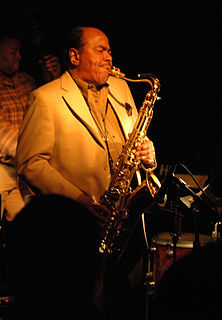
Benny Golson is an American bebop/hard bop jazz tenor saxophonist, composer, and arranger. He came to prominence with the big bands of Lionel Hampton and Dizzy Gillespie, more as a writer than a performer, before launching his solo career. Golson is known for co-founding and co-leading The Jazztet with trumpeter Art Farmer in 1959. From the late 1960s through the 1970s Golson was in demand as an arranger for film and television and thus was less active as a performer, but he and Farmer reformed the Jazztet in 1982.
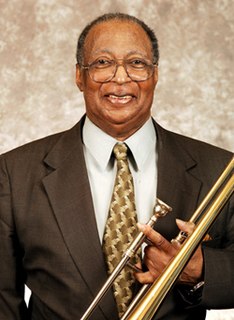
Curtis DuBois Fuller is an American jazz trombonist, known as a member of Art Blakey's Jazz Messengers and contributor to many classic jazz recordings.
"I Remember Clifford" is an instrumental jazz threnody written by jazz tenor saxophonist Benny Golson in memory of Clifford Brown, the influential and highly regarded jazz trumpeter who died in an auto accident at the age of 25. Brown and Golson had done a stint in Lionel Hampton's band together. The original recording was by Donald Byrd in January 1957.
Lex Humphries was an American jazz drummer. He worked with two musicians known for mixing world music with jazz: Sun Ra and Yusef Lateef. As a member of Sun Ra's "Arkestra" he appeared in the film Space Is the Place.

Thomas S. McIntosh was an American jazz trombonist, composer, arranger, and conductor.

Big 6 is the debut album by American trumpeter Blue Mitchell recorded in 1958 and released on the Riverside label. It contains the first recording of Benny Golson's jazz standard "Blues March".

Meet the Jazztet is an album by the Jazztet, led by trumpeter Art Farmer and saxophonist Benny Golson featuring performances recorded in 1960 and originally released on the Argo label.
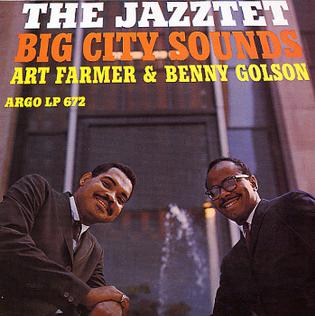
Big City Sounds is an album by The Jazztet, led by trumpeter Art Farmer and saxophonist Benny Golson, featuring performances recorded in 1960 and originally released on the Argo label.

The Jazztet and John Lewis is an album by the Jazztet, led by trumpeter Art Farmer and saxophonist Benny Golson and featuring performances composed and arranged by John Lewis. It was recorded in late 1960 and early 1961 and originally released on the Argo label.
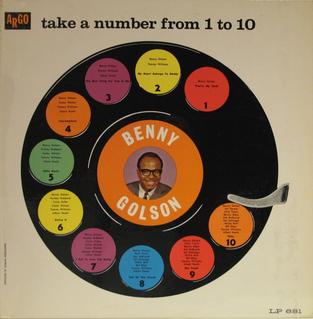
Take a Number from 1 to 10 is an album by saxophonist Benny Golson, featuring performances recorded in late 1960 and early 1961 and originally released on the Argo label.

The Jazztet at Birdhouse is a live album by the Jazztet, led by trumpeter Art Farmer and saxophonist Benny Golson. It features performances recorded in Chicago in 1961 and was originally released on the Argo label.

Here and Now is an album by the Jazztet, led by trumpeter Art Farmer and saxophonist Benny Golson. It features performances recorded in 1962 and was originally released on the Mercury label.

Another Git Together is an album by the Jazztet, led by trumpeter Art Farmer and saxophonist Benny Golson. It features performances recorded in 1962 and originally released on the Mercury label. It was the band's last recording for 20 years.
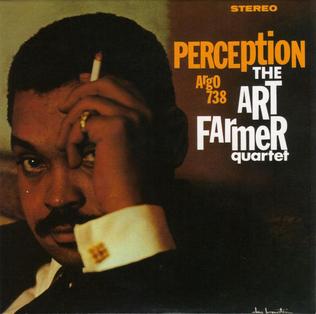
Perception is an album by flugelhorn player Art Farmer's Quartet, featuring performances recorded in 1961 and originally released on the Argo label.

Free is an album by saxophonist Benny Golson recorded in late 1962 and originally released on the Argo label.
The Jazztet was a jazz sextet, co-founded in 1959 by trumpeter Art Farmer and tenor saxophonist Benny Golson, always featuring the founders along with a trombonist and a piano-bass-drums rhythm section. In its first phase, the Jazztet lasted until 1962, and helped to launch the careers of pianist McCoy Tyner and trombonist Grachan Moncur III. Farmer and Golson revived the group in 1982 and it again toured extensively. Each generation of the group recorded six albums, which were released on a variety of labels.
"Whisper Not" is a composition by Benny Golson. It is in a minor key and contains a shout chorus. Golson's account of writing the piece is that "I wrote it in Boston at George Wein's Storyville club when I was with Dizzy Gillespie's big band. I wrote that tune in 20 minutes." Some sources indicate that the first recording was by Gillespie, while others indicate that trumpeter Lee Morgan was first.
"Blues March" is a composition by Benny Golson. It was first recorded for Blue Mitchell's Riverside album Big 6 on July 2 and 3, 1958, and has become a jazz standard.
Tommy Williams was an American jazz double bassist. He played with Art Farmer, Benny Golson, Stan Getz and others before he stopped playing in the 1960s. His last recording from that period was in 1965. He returned to playing years later, but, according to Golson, "died before he could reestablish himself." He played in the Jazztet, where, Golson reported, "I hated to follow [Williams'] bass solos [...] because he could put horn players to shame." He also played alto saxophone, piano, and vibraphone, but, according to pianist Ronnie Matthews, "Bass is what everybody wanted him for because that was the thing that would make your hair stand on end when you heard him play it." In February 1965 Williams played in the Quincy Jones orchestra for the soundtrack to the film The Pawnbroker.

This is the discography for American jazz musician Benny Golson.













